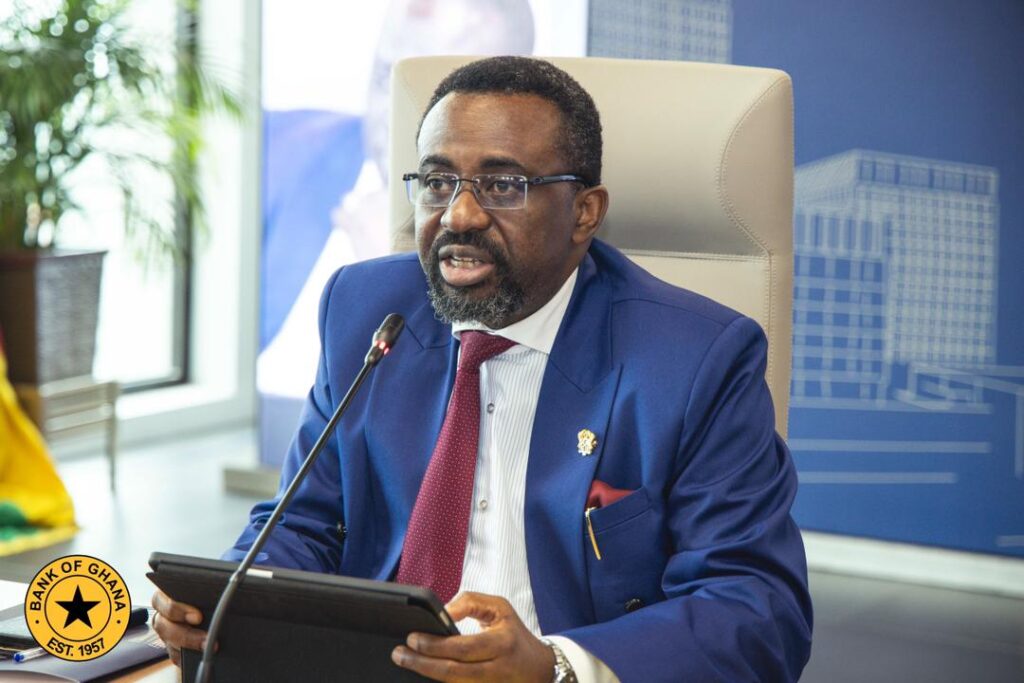Governor of the Bank of Ghana (BoG), Dr. Johnson Asiama, has acknowledged that Ghana’s current signs of economic stability are genuine but cautioned that these gains remain fragile and could easily be reversed without consistent fiscal discipline and policy vigilance.
Speaking at the maiden Pan-African Central Bank Governors’ Conference in Accra, Dr. Asiama said the nation’s economic fundamentals have begun to show signs of improvement after years of turbulence. However, he warned that the recovery is “still being tested” by both global economic headwinds and domestic challenges such as high borrowing costs, exchange rate pressures, and limited fiscal space.
“Economic growth is returning in many of our countries,” Dr. Asiama stated. “Yet beneath this growth lies a clear fragility that must not be ignored. Our stability is real, but it remains vulnerable.”
Dr. Asiama’s caution is significant for Ghana and the wider African region, as many economies are currently emerging from periods of severe inflation, currency depreciation, and high debt levels. Ghana, in particular, is rebuilding market confidence after its 2022–2023 debt restructuring and engagement with the International Monetary Fund (IMF).
While the cedi has stabilized somewhat and inflation has moderated — falling from over 54% in early 2023 to around 25% by late 2025, according to BoG data — the economy continues to face risks from global commodity price swings, external debt obligations, and domestic revenue gaps.
Across Africa, similar pressures exist. Countries such as Nigeria, Kenya, and Zambia are confronting high interest rates and volatile exchange rates, making regional cooperation on monetary policy increasingly crucial. The BoG Governor’s remarks therefore reflect a broader continental concern: how to consolidate fragile stability in a global environment marked by uncertainty.
Ghana’s Credibility Policy

Dr. Asiama emphasized that sustaining Ghana’s recovery depends on strong institutional credibility and effective coordination between fiscal and monetary authorities. He urged African central bank governors to see themselves not only as monetary policymakers but as custodians of public trust responsible for safeguarding confidence in national economies.
He highlighted three key priorities for maintaining macroeconomic resilience:
- Policy Discipline: Keeping government expenditure within sustainable limits and avoiding fiscal slippages.
- Transparency and Credibility: Ensuring open communication on policy decisions to sustain investor and public confidence.
- Coordination: Strengthening collaboration between central banks and finance ministries to align monetary and fiscal strategies.
According to the Governor, coordination failures have in the past contributed to inflationary pressures, exchange rate volatility, and unsustainable debt levels in several African economies.
The conference, co-hosted by the Bank of Ghana and the Bank of England, brought together central bank governors, deputy governors, and senior officials from across Africa. Discussions focused on macroeconomic stability, exchange rate management, inflation targeting, and the rise of digital financial technologies.
In his address, Dr. Asiama stressed the importance of digital transformation and fintech integration in broadening access to financial services and improving payment systems across the continent. He cited Ghana’s mobile money ecosystem — now processing transactions worth over GH¢1.3 trillion annually — as a key example of how technology can enhance financial inclusion and boost formal economic participation.
The Governor further called for the development of regional frameworks for digital currencies and cross-border payment systems, arguing that a more connected financial network could strengthen trade and economic cooperation within the African Continental Free Trade Area (AfCFTA).
“Our shared growth depends on how effectively we innovate and coordinate,” he said. “Africa’s financial integration must be driven by trust, technology, and transparency.”

Despite the optimism surrounding Ghana’s macroeconomic indicators, analysts continue to warn about vulnerabilities. Global oil and gold price fluctuations, reduced foreign inflows, and tightening global financial conditions have made external financing more expensive.
Domestically, Ghana’s high public debt — which stood at about 66% of GDP by mid-2025 after restructuring — limits fiscal space for social spending and infrastructure investment. The private sector also faces elevated lending rates, often above 30%, restricting access to affordable credit and constraining growth in small and medium enterprises.
Experts say that maintaining inflation within the central bank’s medium-term target of 8 ± 2% will depend heavily on continued coordination between monetary policy and government fiscal management.
The Pan-African Central Bank Governors’ Conference underscored that Ghana’s situation mirrors that of many African economies: recovering, yet vulnerable. For nations dependent on primary commodity exports, limited industrial diversification leaves them exposed to external shocks.
Dr. Asiama urged countries to use this period of relative stability to invest in structural reforms, diversify exports, and build buffers against future crises. He noted that long-term stability requires strengthening domestic revenue mobilization, deepening capital markets, and managing public debt prudently.
He also reiterated the importance of regional policy dialogue, stressing that coordinated action across Africa could reduce exposure to external shocks and enhance collective bargaining power in international financial markets.

Ghana’s economy has experienced significant volatility over the past decade — from strong growth during the oil boom years to fiscal stress, currency depreciation, and inflation surges in the early 2020s. The government’s IMF-backed reforms, initiated in 2023, helped restore some macroeconomic stability through tighter fiscal controls and debt restructuring.
The Bank of Ghana has played a key role by raising policy rates, improving foreign reserve management, and implementing measures to curb speculative trading in the foreign exchange market. These steps have contributed to stabilizing the cedi and reducing inflationary pressures, though growth remains moderate, projected at around 3.5% for 2025.
Dr. Asiama’s remarks serve as both a reassurance and a warning. Ghana’s economic stability is indeed real — underpinned by sound policies and improved indicators — but it remains fragile in the face of global and domestic pressures. The challenge, he noted, is for policymakers to maintain discipline, credibility, and innovation to ensure that current gains translate into sustainable, inclusive growth.
As the nation and continent look ahead, the conference’s key takeaway was clear: Africa’s future economic strength will depend not just on recovery, but on resilience.

